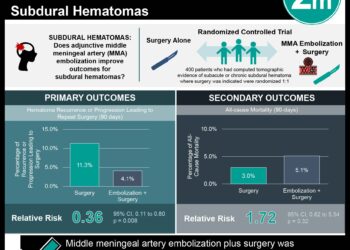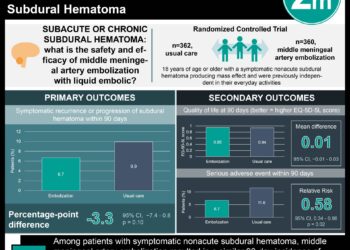Preoperative tumor embolization does not reduce operative blood loss
1. Embolization of spinal metastases without regard to the primary tumor origin does not reduce intraoperative blood loss or transfusion requirement, but it may reduce operative time by roughly one quarter among patients undergoing surgical spinal decompression.
2. In subgroup analysis of hypervascular metastases—such as those from renal cell carcinoma—a statistically significant reduction in intraoperative blood loss was seen, but this finding is of uncertain clinical significance.
Evidence Rating Level: 1 (Excellent)
Study Rundown: An increasing number of patients with malignancies suffer from spinal metastases as life expectancies increase. Surgical management of such metastases is often able to improve the quality of life for such patients by relieving cord compression and providing spinal stabilization, but risk for significant intraoperative blood loss limits the candidacy of many patients for such treatment. Previous retrospective studies have suggested that preoperative embolization, particularly of hypervascular metastases, may be effective in reducing intraoperative morbidity related to blood loss or transfusion requirement, but were limited by their study design. The current study was a single-blinded, randomized controlled clinical trial examining whether preoperative embolization of spinal metastases, regardless of the primary tumor origin, may reduce intraoperative blood loss, transfusion requirement, or operative time for patients undergoing thoracic or lumbar spine decompression and spinal instrumentation. In an attempt to determine if embolization may be of value regardless of tumor vascularity, all primary tumor types were included in the trial. No significant reduction in intraoperative blood loss or transfusion requirement was found between patients receiving preoperative embolization and the control group, though a moderate reduction in operative time was found. In a subgroup analysis of hypervascular tumors, a statistically significant reduction in blood loss was found, but was considered clinically insignificant.
The study was limited by a small sample size in that it could not achieve the power necessary for subgroup analysis to differentiate between the effects of embolization on avascular and hypervascular tumors among the heterogenous sample group studied. Additionally, no data was collected with regard to metastatic distribution, which may have an effect on intraoperative bleeding, and larger surgeries were excluded from the study, such as corpectomies, where the effects of embolization may be more pronounced. Future studies to delineate the role of embolization between avascular and hypervascular tumors is warranted, as is examination into methods of noninvasively determining the vascularity of a given metastasis.
Click to read the study in the Journal of Vascular and Interventional Radiology
Relevant Reading: Blood loss in spinal tumor surgery and surgery for metastatic spinal disease
In-Depth [randomized controlled trial]: A total of 45 patients with spinal metastasis requiring surgical decompression of the thoracic or lumbar spine were enrolled over two years and randomized, in a single-blinded fashion, to either the experimental arm (n = 23), receiving preoperative metastasis embolization, or to the control arm (n = 22), which only underwent angiography. Outcomes of intraoperative blood loss, blood transfusion requirement, and operative time were examined, with a pre-determined threshold of a 500mL reduction in blood loss set for clinical significance. No significant differences in baseline characteristics were present between the groups, with an average age of 64 years. A significant heterogeneity of primary tumors was notable among subjects: 32-44% had primary lung tumors, 9-26% had primary breast, and the remainder had prostate, renal, colon, gastric, rectal, esophageal tumors or melanoma. Mean intraoperative blood loss did not differ between the embolization and the control groups (618±282mL and 735±415mL, respectively; p = 0.270.) Additionally, no significant difference was found between transfusion requirements between the groups (p = 0.243), though a significant reduction in operative time was found at a mean of 90 minutes versus 124 minutes (p = 0.031.) Subgroup analysis of hypervascular metastases showed a significant reduction in blood loss in the embolization group versus the control group (645±289mL vs. 902±416mL; p = 0.041), though this difference of 257mL failed to meet the preset requirement for clinical significance.
More from this author: Radiation from follow-up imaging may significantly impact life expectancy, Diffusion tensor imaging may aid Parkinson’s diagnosis, Perfusion imaging may predict successful thrombolysis in acute stroke
Image: PD
©2014 2 Minute Medicine, Inc. All rights reserved. No works may be reproduced without expressed written consent from 2 Minute Medicine, Inc. No article should be construed as medical advice and is not intended as such by the authors, editors, staff or by 2 Minute Medicine, Inc.







